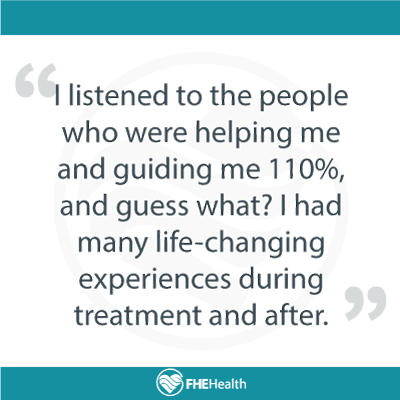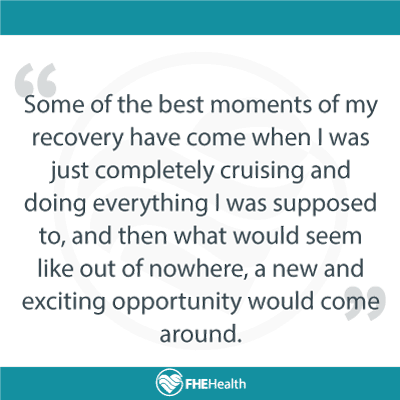
I often tell people early on and new to recovery that they are entering warfare with their minds. The disease of addiction and alcoholism centers within the mind — only the most powerful thing in the world if you ask me. No big deal.
So, what does untreated addiction look like in the mind? What is ‘untreated addiction’? It is basically our state of mind when we have no substance in us and no solution (believed to be the 12 steps by most). You would think untreated would meanwhile you are using or drinking, but that is actually how we treated our mind disease for however many years we have been trying to manage it.
To try and put it as simply as possible, perhaps the biggest reason we use substances heavily is to effectively shut our minds off as best as we can. I mean, it works, right? One of the first things I noticed when I started using opiates was that my mind didn’t have those loud thoughts banging around constantly that caused me fear and anxiety. So naturally, I wanted to be high on opiates 24/7.
In essence, during my active addiction, I wasn’t at my worst when I had whatever drugs/alcohol I needed; I was at my worst when I didn’t have what I needed. When I didn’t have my stuff, that’s when I would have to scheme, lie, manipulate, and basically do whatever I had to in order to get the necessary substances. I wasn’t very friendly either in those cases.
Did I want to scheme and lie to people I loved and cared about? No, but that didn’t matter; my diseased mind told me I had to; I had no other option. Step 1 says to admit ‘our lives had become unmanageable.’. What’s unmanageable? My thinking.
Think about when you tried to stop on your own; no matter how many promises you made to others or yourself, you picked up again.
Why is that? Your mind said so, and the only way we know naturally is to listen to that mind, exactly where your deadly disease is located.
So, what can you do about that? Stop listening to your mind and start listening to something/someone else!
Getting Out of My Own Way
 I believe in every person who has long-term sobriety. They had a revelation early on that they did not know what was best for them, and it would be a long time before they did. Once you can internalize that honestly, you are well on your way.
I believe in every person who has long-term sobriety. They had a revelation early on that they did not know what was best for them, and it would be a long time before they did. Once you can internalize that honestly, you are well on your way.
The hard part is recognizing that because it’s something you need to remind yourself of for the rest of your life, there has to be at least some pain and consequence to even get to that revelation. Through that pain, we become more open to living a different way than the way our mind tells us to live.
Okay, enough setting the table, and thank you for sticking with me.
The last time I went to treatment (there were several visits), I honestly was tired of thinking I knew what to do and what was best for me. I got burned every time before this by following my mind’s ideas and opinions on issues in my life. I didn’t trust myself anymore.
Thank God I didn’t. I had finally gotten out of my own way.
My opinion on things didn’t matter anymore; what I thought was best didn’t matter anymore. I listened to the people who were helping me and guiding me 110%, and guess what? I had many life-changing experiences during treatment and after.
There were moments where I started to insert my thinking into certain things early on; but, I had others remind me that helped me remind myself that I am at my best when I stay out of my own way.
That is one of the most important facts in my life.
Staying Out Your Own Way
 As we keep living right and keep working on a recovery program, our lives will organically begin to get more extensive and more intricate. If you are living in the steps, you are growing and evolving as well. For the most part, you will feel great a few years into recovery and try your best to live a spiritual life.
As we keep living right and keep working on a recovery program, our lives will organically begin to get more extensive and more intricate. If you are living in the steps, you are growing and evolving as well. For the most part, you will feel great a few years into recovery and try your best to live a spiritual life.
There will be stumbling blocks though, they are inevitable. I cannot speak for anyone else, but the most significant cause of my funks in recovery was when I was relying on an expectation. Something did not go the way I thought it should, or somebody didn’t act like I thought they should.
That’s when fear, insecurity, agnosticism, and all that fun negative stuff my mind is capable of starts to dominate me.
I would get back in my own way. My life had become more of what I thought it should be rather than just accepting/trusting the reality of things and doing the next right thing.
That’s what getting/staying out of my way means. It means just doing the next right thing, the things I’m supposed to do each day. Every day I wake up, I have responsibilities and obligations. When I just get up and do them and keep my opinion or view out of it, I have peace of mind, and I am generally happy. I have good, smooth, sober days. That is all I can ask for.
I am 6 years down my road in recovery now, I have gotten in my way plenty, and it took me a while sometimes to actually do it, but I can say that I have always gone back to removing ‘me’ from the way my life goes.
Some of the best moments of my recovery have come when I was just completely cruising and doing everything I was supposed to, and then what would seem like out of nowhere, a new and exciting opportunity would come around.
Right now, I am very happy with where I am in life, both personally and professionally. The only way I got here feeling this way is by just sticking to doing what’s right even when things got a little rocky; even when I began to question why things were happening, I stayed out of my own way.
That’s the only reason I am still here and still sober.






